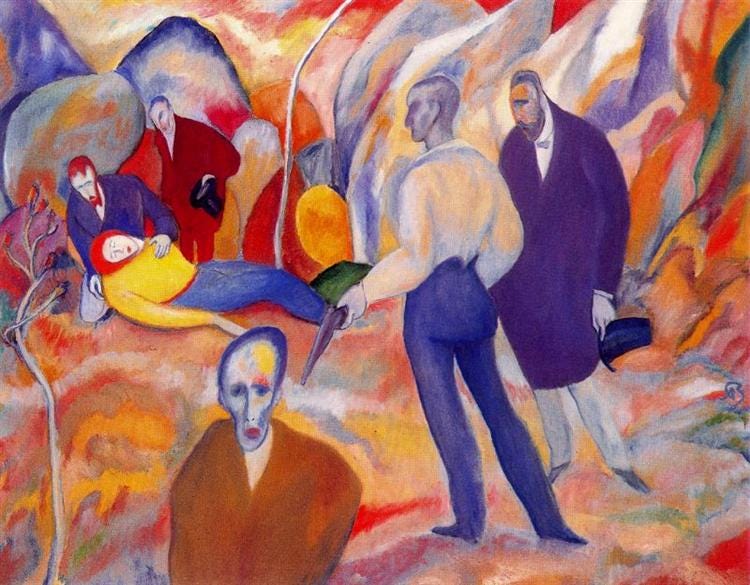endings
the way we do breakups is wrong
At the risk of sounding overly dramatic, I truly believe that when someone you really care about breaks up with you, they are breaking a piece of your soul.
We’re all connected by virtue of living on this planet, but there are certain people whose existence matters deeply and personally to us, whose lives are entangled with our own. We carry their feelings, thoughts, and spirit everywhere we go, within our own body, mind, and soul. As the philosopher Agnes Callard puts it in her 2021 Harper’s Magazine essay “Breaking Points”:
“You can’t waltz by yourself. When I lose you, I also lose the me I became for you. And vice versa. Which is why cutting you off, once we have grown together, is an act of violence. I am not cutting anything visible, like your arm or leg, but I am nonetheless cutting away something that is a part of you—me. This is an act of psychological violence.”
— Agnes Callard
You might argue, shouldn’t I have full governance over my life? If a relationship isn’t working for me, don’t I have the right to walk away? The problem with this thinking is, it’s not just about you and your life. It’s about two people whose lives are intricately entwined, two people who have “grown together,” like the roots of trees that have come to depend on one another for nutrients. A relationship, in this sense, is a living, breathing thing. Ending one is an act of violence.
We can’t discard people the same way we discard clothes we’ve outgrown or objects in our house that no longer “inspire joy.” The best breakups (if there can be such a thing) are truly mutual. Both people understand why they’re doing it and accept it as the best outcome for both parties.
Generally, anyone in a significant relationship—whether it’s romantic or platonic—deserves a seat at the table when it comes to any decision that impacts both parties, including, and perhaps especially, the most consequential decision of all, to end things. The goal should be to come to an agreement about what’s best for both of you. Whether it’s to part ways or give your relationship a second life in a new form, the decision should never be unilateral.
Relationships are complicated, and the problems arising from them require creative, out-of-the-box solutions. Too often, especially in romantic relationships, people assume that if it’s not working, the only option is to leave. They fail to see that the parameters confining the relationship can be revised. For example, maybe monogamy is overly restrictive and you would both benefit from exploring other people. Or maybe cohabitation isn’t working, but you can make alternative living arrangements and still be together without living together.
Whatever mutual agreement you arrive at should always be subject to change down the road. Relationships aren’t static, and the rules governing them shouldn’t be static either. That’s the only way they can work.
“Often a relationship that doesn’t work in one form might work in another form, a renegotiated one. And even if no livable arrangement can be arrived at, such an ending should be the product of the reasoning of all parties involved.”
— Agnes Callard
We’ve been conditioned to think in black-and-white terms when it comes to romantic partners. You’re either “the one” or you’re not. It was either “meant to be” or it wasn’t. This type of thinking is fatalistic and abdicates not only individual agency but any responsibility we have to each other.
I strongly believe that if something you’re thinking or feeling impacts a person who is near and dear to you, you have an obligation to bring them along on your thought process and emotional journey as early as possible. For example, if you have doubts about your future together, you should discuss your concerns with your partner instead of processing it all on your own. What’s worse than a unilateral breakup is a unilateral breakup that the other person didn’t see coming.
In some cases, even after much negotiation, you might not be able to come to a joint decision about what’s best for both of you. But there should always be an earnest attempt. The effort is very important. It’s part of our social obligation to take into consideration what our loved ones want. We can’t just cut them out and leave when things aren’t working for us.
I’ll end by sharing some artifacts from “The Museum of Broken Relationships,” which I stumbled upon at the MODO gallery in Mexico City. These personal items commemorate relationships that have ended, and the accompanying stories written by the former owners are poignant and remind me of our fundamental need as humans to find meaning and share impact.
Here’s an excerpt from the overview of the exhibition:
“Whatever the motivation for donating personal belongings—be it sheer exhibitionism, therapeutic relief, or simple curiosity—people embrace the idea of exhibiting their emotional legacy as a sort of ritual, a solemn ceremony.
Our societies oblige us with marriages, funerals, and even graduation farewells, but deny us any formal recognition of the demise of a relationship, despite its strong emotional effect.”










